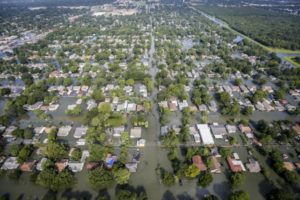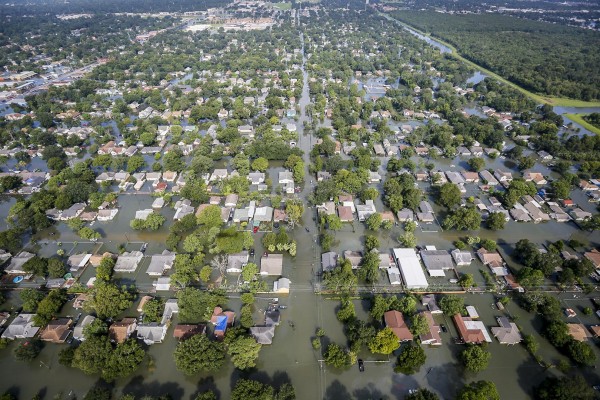After Hurricane Harvey inundated David Bush’s home with 20 inches of rain, he knew he wanted to rebuild but was worried about how his property could be protected from the next big storm.
So Bush came up with a solution to prevent future flooding that is more associated with entire communities or cities like New Orleans than with individual homeowners.
He decided to build his own levee.
“We do have a peace of mind with the rains coming and if any floods come,” Bush told the Houston Chronicle. “Our levee might get tested but we hope that it never, ever does get tested.”

An aerial view shows extensive flooding from Harvey in a residential area in Southeast Texas, Aug. 31, 2017
The decision to construct a levee comes as many county residents, reeling from Harvey in 2017 and major flooding incidents the two previous years, are coming up with their own solutions to prevent flooding from future storms. Some neighbors formed their own group to push for flood prevention and some county residents are electing new board members to their levee improvement districts.
Rick Staigle, an engineer with Fort Bend County, said the county has received many applications from property owners to raise the elevation of homes, but not many to build a wall – or levee.
“Most of the residents aren’t going to go through this level of expense,” Staigle said. “Truthfully, they need quite a bit of property to be able to do it. People that are living in a deed-restricted community are going to have additional hurdles that they have to address.”
Hurricane Harvey, which made landfall last August, led to the evacuation of more than 200,000 people in Fort Bend County while damaging or destroying more than 6,800 homes.
“We didn’t know what we were going to do,” Bush said at his home recently. “We were shocked. Both my wife and I are native Houstonians. We’d been through a lot of storms. We’d never personally experienced or been affected by anything like this before in our lives.”
Bush, 48, who lives with his wife and three children, purchased the family’s home on McCrary Road in May 2017.
He said his family knew the risk that came with purchasing the home because the house had flooded during the Memorial Day 2016 floods.
The house, which sits on about three acres, was originally built in 1965; the original homeowners lived in it until they became tired of dealing with flooding. An investor purchased it from the older couple and completely remodeled the home. Bush made sure to buy flood insurance when he purchased the property.
When Harvey came to Richmond, Bush’s family was evacuated but he stayed behind because water hadn’t yet come inside the house. He placed sandbags around the doors to stop water from coming in. It wasn’t until the Brazos River crested over its banks a few days later that water began flowing into the house.
Despite their home being devastated by the storm, Bush and his wife decided to rebuild. They thought about raising their home to prevent future flooding, but the cheapest quote they received was for $135,000.
His wife heard on a radio talk show about a company that built levees.
Daniel Dean, who started his Magnolia-based business when he was a high school junior, told the family that their best bet to keep out water would be to construct a levee around the house. Dean has constructed only one other levee for a homeowner since the hurricane. He said he has also cut and created swales around homes to help redirect water from homes, which usually costs about $3,000 to $4,500.
It would cost $40,000 to construct the levee, Bush was told.
Dean, 43, said the levee option won’t work for every homeowner, but it worked well for the Bush family because water surrounded their home during the hurricane. Dean has looked at levees as options for several homes but sometimes they didn’t have enough land or it was too expensive for the family.
“If there’s not enough room to build in between their house and the edge of the property line, then we can’t do it,” Dean said.
Dean didn’t face as many obstacles in constructing the Bushes’ levee, which sits 28 inches above the floor of their home. Bush had to get a permit from the county and the city of Richmond, but because his house is not in a subdivision, he did not have to deal with a homeowners association.
He cautioned homeowners to go through the proper channels before deciding to construct a levee.
“I can understand the grief of people wanting to advocate and take things into their own hands, but they’ve got to realize that they’ve got to pursue the right avenues and get approvals before they start doing it,” Bush said.
Larry Dunbar, a water resources and environmental engineer who has been a consultant for the Fort Bend County Drainage District, notes that residents who are worried about their own properties flooding as a result of a levee being constructed near their home should not be concerned if the project was approved by the county.
“I don’t think they should, as long as that project got reviewed and approved by the county, then that issue should’ve been analyzed and determined to not be an issue,” said Dunbar. “Now, if someone just does it on their own then I would be concerned.”
Bush’s levee, which only took about a week and a half to construct, now surrounds the house. Bush walked around and surveyed the work. He can’t predict what the hurricane season that started June 1 will hold for Fort Bend, but said he feels more prepared this time around.
“If it does get tested, we have a sense of security and peace of mind that the river itself has got to go much higher than it did last time in order for it to go over the levee,” he said.
Was this article valuable?
Here are more articles you may enjoy.


 Tesla Sued Over Crash That Trapped, Killed Massachusetts Driver
Tesla Sued Over Crash That Trapped, Killed Massachusetts Driver  One out of 10 Cars Sold in Europe Is Now Made by a Chinese Brand
One out of 10 Cars Sold in Europe Is Now Made by a Chinese Brand  Elon Musk Alone Can’t Explain Tesla’s Owner Exodus
Elon Musk Alone Can’t Explain Tesla’s Owner Exodus  FM Using AI to Elevate Claims to Deliver More Than Just Cost Savings
FM Using AI to Elevate Claims to Deliver More Than Just Cost Savings 